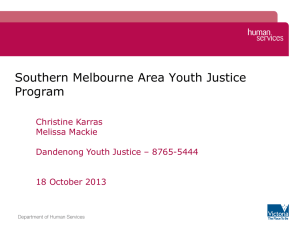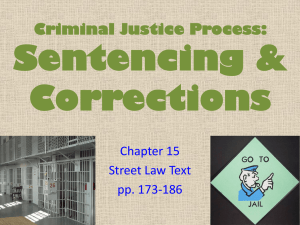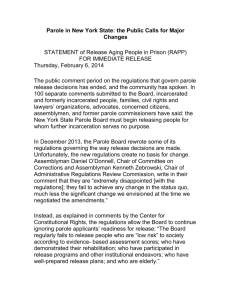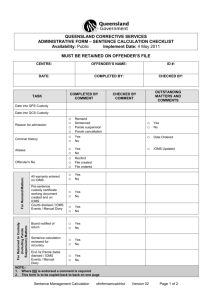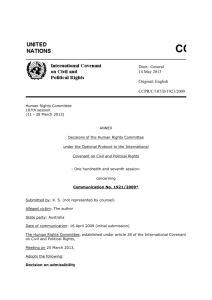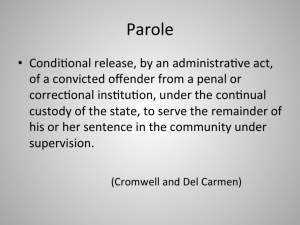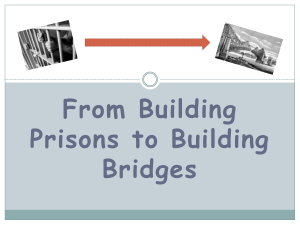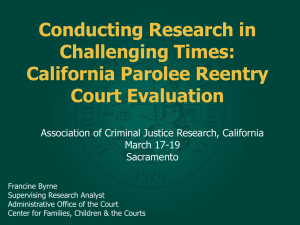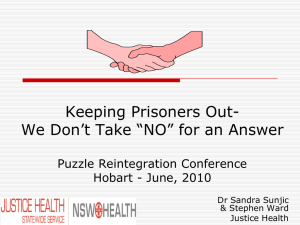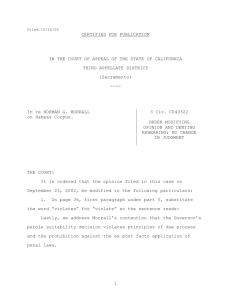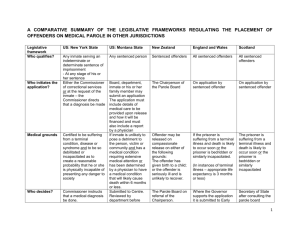Post Sentencing Decisions montanna
advertisement
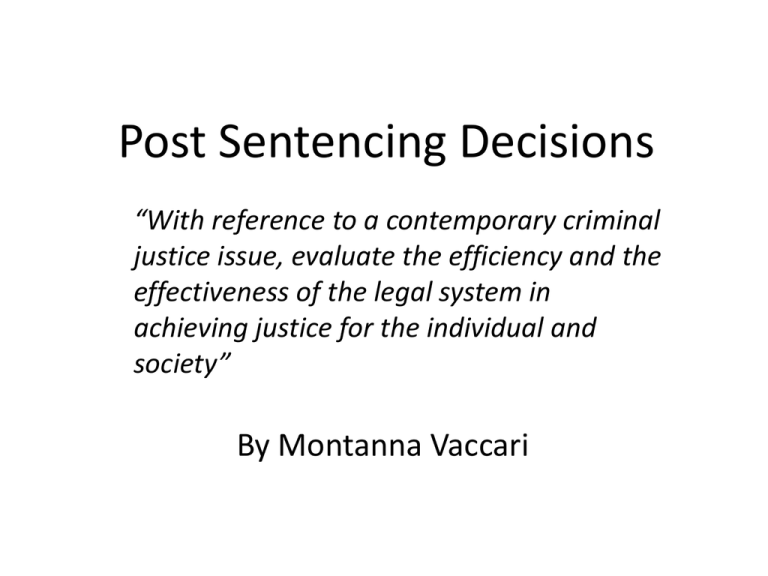
Post Sentencing Decisions “With reference to a contemporary criminal justice issue, evaluate the efficiency and the effectiveness of the legal system in achieving justice for the individual and society” By Montanna Vaccari What is post sentencing decisions? - How offenders are treated - Rules that apply following the sentencing process. -If the aim is to protect society from the offender, the security classification must be considered - If the aim is rehabilitation, then parole should be an option. Post – sentencing decisions Security classification Protective Custody Parole Security Classification There are three general security classifications in New South Wales prisons: minimum, medium and maximum security. The cost of housing inmates rises with the level of security. * Generally all prisoners have the right to: * Unlimited visits by legal representatives * One or two other visits per week * Ownership of simple possessions * Write and receive letters * Complain to the Ombudsman * Proper care, including food, clothing and medical care. Protective Custody - Protect prisoners vulnerable to attack from fellow inmates. - Prisoners in protective custody are segregated from the mainstream prison population - Placed in a special unit Parole - Parole is the discharge of inmates from custody prior to the completion of the minimum term on the provision that they agree to certain conditions. - Public interest is of primary importance. The Parole Board will look at: • Statements made by the sentencing judge • The inmate’s prison and criminal record • Other relevant custodial reports. Reforms, Cases and Legislation LCMD Reform: - Parole Board Cases: - Victor Chang - R v Astill Legislation: - Crimes (Administration of Sentences Act 1999 (NSW) - The Sentencing Act 1989 (NSW) -Protective Custody Bill 2000 Crimes (Administration of Sentences Act 1999 ) (NSW)- Protective Custody This act deals with how offenders are treated, and rules that apply following the sentencing process. Matters covered by this Act include rules of management, correctional centres, including segregation and general discipline, when inmates will appear before the visiting justice; administration of home detention and periodic detention and when those orders can be revoked; and matters associated with parole. R v Astill- Protective Custody "In the culture of Australian gaols, it seems, even some of the most hardened offenders feel entitled to vent moral outrage against those inmates allegedly involved in crimes against children." PROBLEMS: - Still being assaulted, abused or judged - Restricted in protective custody due to societies perceptions and morals. Parole Board The Parole Board consists of three members: - one must be a Legal Practitioner with at least seven years' experience - two must have experience in sociology, criminology, penology or medicine -the Governor appoints a chairperson from the above members The Parole Board has the authority to: - grant parole - defer making a decision on whether a prisoner should be released on a parole order - refuse to release a prisoner on a parole order Parole Board Relevant points before making a decision: • the likelihood of re offending • the protection of the public • comments made on passing sentence (by the magistrate or judge) • the likelihood of the prisoner complying with conditions • the circumstances and the gravity of the offences committed • the behaviour of the individual while in prison • the behaviour of the prisoner during previous parole orders • the behaviour of the prisoner during other orders (eg: probation order and community service order) • the probable circumstances of the prisoner after release from prison Effectiveness or Problems EFFECTIVE - Ethical and fair - Parole Boards are expertise - Achieves justice for individuals and society from unsafe or dangerous prisoners. Victor Chang- Parole One of two men convicted of killing Sydney heart surgeon Victor Chang is to be deported after being released from an Australian jail. Mr Costa said “our thoughts are with the Chang family during this difficult time”. Effectiveness or Problems Effective and Problematic Effective: -Acts as an incentive for prisoners which leads them to being on good behavior. - Grants justice for Prisoners Problem: - Tricks, Society may be in further danger The Sentencing Act 1989 (NSW)- Parole This act requires every prisoner to serve a minimum sentence before becoming eligible for release on parole. The sentencing judge is required to state both the total sentence and the length of time that the prisoner must remain in custody before becoming eligible for parole. Effectiveness or Problems EFFECTIVE -Treats everybody equally -Fair - Achieves Justice -Effective legal system - Relieves stress

